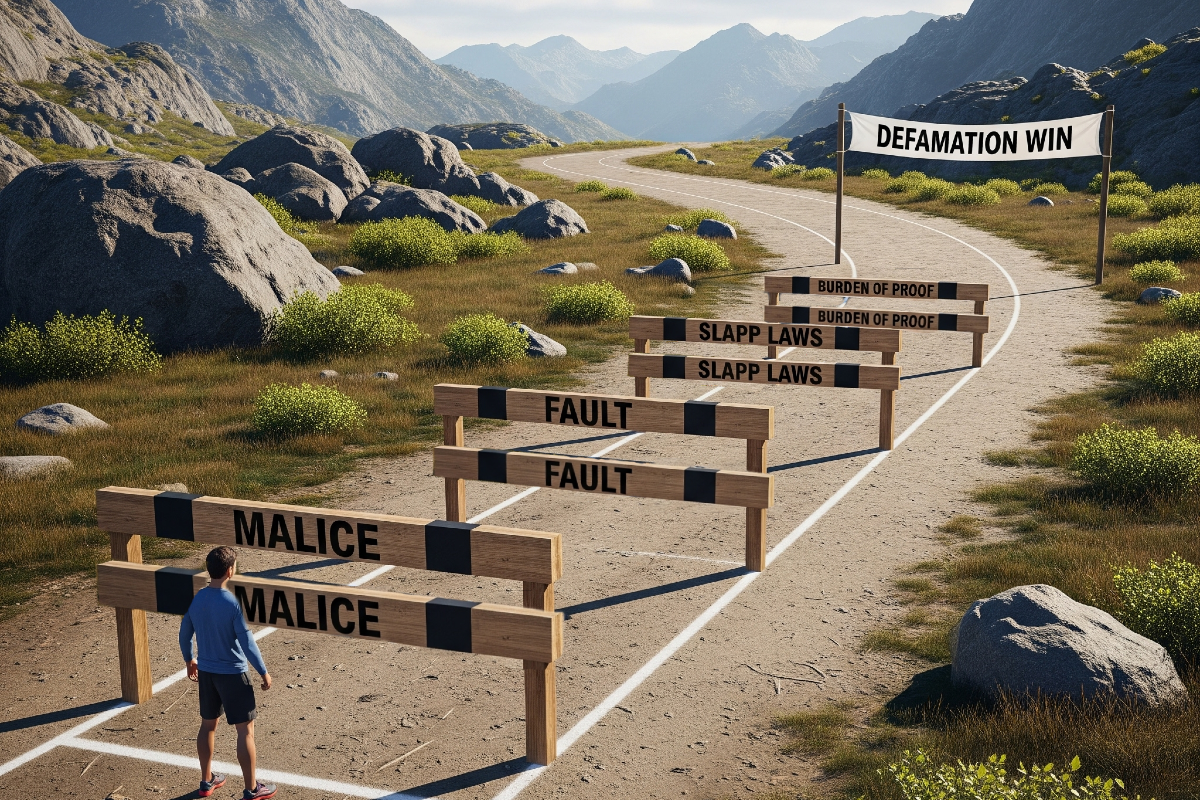
BALTIMORE
10075 Red Run Boulevard
Suite 401
Owings Mills, MD 21117
(443) 738-4900
FREDERICK
10 North Jefferson Street
Suite 200
Frederick, MD 21701
(240) 220-2415
BETHESDA
7315 Wisconsin Avenue
Suite 400W
Bethesda, MD 20814
(240) 220-2415
It’s Not Easy for a Public Figure to Win a Defamation Case
July 31, 2025
Laura L. Rubenstein

Recent political banter has brought public attention to defamation claims. Perhaps you’ve heard of that little lawsuit filed in the U.S. District Court for the Southern District of Florida by a sitting U.S. President seeking $20 billion in damages against multiple defendants including the Wall Street Journal, Rupert Murdoch, Dow Jones & Company, and News Corporation regarding a birthday card illustration and message to a now deceased convicted sex offender? While many people understand the terms defamation, slander and libel liberally, most don’t realize how difficult it is for a well-known plaintiff to succeed in a defamation lawsuit, mainly because of the rights afforded by the First Amendment. The right to free speech and free press often clash with defamation law. Although these freedoms exist to promote issues of public concern, an individual possesses a right not to be subjected to falsehoods that damage their reputation.
Former United States Supreme Court Justice Potter Stewart wrote that the essence of a defamation claim is the right to protect one’s good name. He explained in Rosenblatt v. Baer, 383 U.S. 75, 86 S. Ct. 669, 15 L. Ed. 2d 597 (1966) that the tort of defamation “reflects no more than our basic concept of the essential dignity and worth of every human being — a concept at the root of any decent system of ordered liberty.”
At its core, a defamation claim, whether its written (libel) or spoken (slander) requires (1) a false statement, (2) publication to a third party and (3) fault. The first two requirements are self-explanatory and usually do not need an in-depth analysis. Fault, however, is a little more complicated and the standard depends on the plaintiff’s status.
Public officials and public figures must also show “actual malice” meaning that the defendant knew the statement was false or acted with reckless disregard for the truth. The landmark Supreme Court case N.Y. Times Co. v. Sullivan, 376 U.S. 254 (1964) established the “actual malice” standard for defamation claims involving public officials. In that case, a well-known newspaper criticized actions taken by a public official who in turn filed a defamation lawsuit.
The Supreme Court found that “debate on public issues should be uninhibited, robust, and wide-open, and that it may well include vehement, caustic, and sometimes unpleasantly sharp attacks on government and public officials.” Debate on matters of public concern is essential to a functioning democracy and imposing liability for honest mistakes or criticisms is unjust. History has shown that United States courts rarely find that actual malice exists. Any politician or public figure attempting to succeed in a defamation case must prove that the defendant either knew the publication was false or they harbored serious doubts and did it anyway.
The complaint would also likely fall under Florida’s anti-SLAPP law. SLAPP stands for Strategic Lawsuit Against Public Participation. These types of lawsuits are intended to intimidate, silence, or punish critics by burdening them with the cost of a legal defense, even if the case lacks merit. SLAPPs are often used against persons or entities that speak out on matters of public interest, such as journalists, activists, or whistleblowers.
In this current case, the plaintiff may have another hurdle to overcome based on a doctrine recognized by Florida federal court making him libel-proof. That’s the idea that some people are so reputationally damaged, either across the board or on a certain topic, that even false and defamatory statements about them cannot cause any further harm that can be remedied by a court award of monetary damages.
Legal scholars are predicting that this defamation lawsuit could share the same fate of a similar one filed against the plaintiff’s former “fixer” Michael Cohen. In that case, it was dropped shortly after depositions were scheduled requiring the plaintiff to answer questions under oath by defense counsel.
